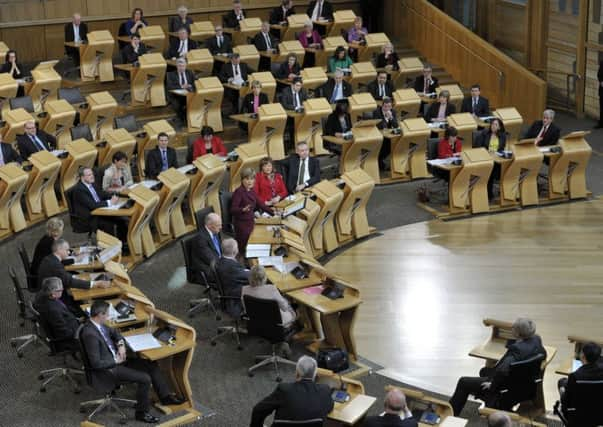Scott Macnab: Holyrood lacks necessary scrutiny


The recent controversy over tax credits at Westminster and the eventual climb-down from Chancellor George Osborne showed the pivotal role that a strong, independent second chamber plays in the UK democratic process. The House of Lords, for all the flak it gets, was able to demonstrate its freedom from the elected government of the day and block the tax measures amid concern over the impact they would have on working families.
But do such similar democratic safeguards exist in Scotland? Holyrood’s committee system once filled this key role, staging ground-breaking inquiries into issues affecting civic life across the country and holding Scottish administrations of all hues to account. But things changed in this Parliament as the SNP’s Holyrood majority, and the party hierarchy’s steely grip on all levers of control, prompted growing fears that a cult of “obedience and slavishness” was emerging among many SNP members on committees.
Advertisement
Hide AdAdvertisement
Hide AdJust last year, the public audit committee was left in the farcical situation of effectively publishing two versions of a report on the proposed national police force. One of these, backed by the SNP majority, was supportive of the change. At the same time, a second minority report, endorsed by opposition members, made a range of criticisms.
There is also a growing concern – which has been brewing for some time – that Holyrood’s committees are failing to exhibit the necessary bite when it comes to scrutiny of the SNP government. Two things make this increasingly acute. The first is that, barring a Lazarus-style recovery from Labour, the SNP is poised for another Holyrood majority in next year’s Scottish Parliament elections, meaning its dominance at Holyrood will continue for several years. Secondly, MSPs are poised to take on sweeping new controls over areas including income tax and welfare in the coming years which will make Holyrood one of the most powerful devolved Parliaments in the world.
So where are the checks and balances we have come to expect? If an unpopular proposal, such as the tax credits, was to come forward in Scotland, what could be done? No doubt Nicola Sturgeon would insist no such measure would ever be proposed by a Nationalist administration, but this misses the point which is the absence of democratic overview.
Holyrood’s Presiding Officer, Tricia Marwick, has recognised the issue, launching a call for bigger, more powerful committees – with convenors to be elected by MSPs in a secret ballot. But the move met with a frosty reception from Holyrood’s standards committee. The SNP’s business minister, Joe Fitzpatrick, went further when he appeared before MSPs last month, urging caution over the prospect of changing the make-up of committees, insisting they must reflect the “democratic wishes” of the people at an election. Committees are doing a “really good job” holding the Scottish Government to account, he said, citing examples where legislation has been changed on their say. It was all the media’s fault, according to the minister, as only “party political division” gets reported.
Of course Fitzpatrick is right to point out that what is happening is just democracy in action and the make-up in Parliament simply reflects the sweeping majorities which the SNP has enjoyed at the ballot box. But the Holyrood voting system was deliberately designed to preclude such landslides and thus prevent any one party from having such an vice-like grip on the organs of control in government and Parliament. As Scotland looks ahead to the potential of another four years of one-party dominance after next year’s election, surely the time has come to confront this shortfall in effective overview in our democracy.